Mari Pimenta is a location-independent career coach from Brazil. Mari kindly took the time to talk to us about how and why she became a digital nomad. We covered a lot, from using English teaching as a transition into location independence to her love of coworking spaces and also why she froze her eggs before leaving Brazil. This is quite a long interview but Mari is such a great story teller it was near impossible to leave anything out!
On the transition to a digital nomad lifestyle
When I left Brazil the first time – well not the first time, I lived abroad when I was a child, I lived in the States for many years when my dad went there to do his MBA, I was lucky because I got to learn English between five and ten, which is a great age to develop a new language – but, the first time I left Brazil as an adult, for over 15 days, because I always had 15 days of vacation, or 20 days of vacation – was exactly a three month period.
I went to Montreal, and then I went to Vancouver to do my coaching specialisation, and that’s actually where I learned how to work online.
After three months I came back to Brazil and I had this job offer, great job offer that I was going to make a bunch of money. They wanted me to manage an office at a really good coaching multinational company that I hadn’t included in my career transition plan (but) I wanted to work with them, because they were really big all over the world.
But that three month trip changed my mindset so much and the fact that I had learned how to work online also was just mind blowing. I did seven interviews and I spent three months in Brazil trying to make a decision, “should I take this job and go back to the corporate life and everything?” Or should I take the risk and go travelling with these online skills that I had just learned.
And it was so hard, I remember it was one of the hardest decisions I had to make and I was so afraid. Because I was 37 and I didn’t have a boyfriend, I think having a boyfriend or a girlfriend really makes you feel safer. I didn’t, I was by myself and I wasn’t making any money with coaching yet, because I had just graduated from my international coaching course.

I had my law degree, I had my MBA degree and I had all the experience I gathered teaching English for 15 years, because I had five language schools.
Today, finally I have a good income that comes from the coaching already (and) I have two (English) teachers that I hired and trained, and they work as freelancers for me, so I can focus my time on the coaching aspects and the podcasts and the things that I’m trying to launch. But having what I call today the transition income – that’s what I always tell my clients: “you need to have a transition income” – so me teaching English online for a while, maybe 6 months after I left Brazil, that’s all I was doing, gave me that safety.
Even though it’s not what I wanted to do in my professional future. I don’t just want to teach English online, because that wouldn’t be challenging for me because I’ve been doing it for so long. But the funny thing is, the English teaching is actually a door for many English students to then hire me as a coach. So I have a bunch of English students who are also my coaching clients. They do the English classes with the two teachers that work with me and then they do the coaching.

On dealing with the risks of moving away
There were so many risks, personal and professional. So being 37, wanting to be a mother, for a woman, sounds crazy like “how are you going to leave now, you should stay here!” I have been in long relationships, like I’ve had an an eight year relationship, a six year relationship but I was single and I wanted to be a mom and what most women would do is stay put so they can try to create a regular type relationship.
But I was just so tired of Brazil and I was just tired of Brazilian men, because I had these relationships and guys in Brazil cheat, you know, Latin American style. It’s just not what I wanted.
So the personal side, I decided I needed to freeze my eggs and I like talking about this because there are many women my age who want to travel and don’t know how to solve this kind of situation. I think I did a great job freezing those eggs. It’s expensive, but having a child, for me, is one of my biggest dreams so it was worth investing. And I did that and I felt so relieved! Because my doctor told me “ok now, you have four eggs and normally when we decide to unfreeze them – when you find the father of the baby – you come back here, we unfreeze them, we’ll probably lose 50 % of these eggs, so whenever you have the chance, let’s do it again, so we have a bigger stock of eggs.” I was like “oh Jesus, ok.”
So then I travelled for a year and a half and I lived in a bunch of countries and I was so happy about my life, never been so happy with my freedom. I could work from anywhere, Bali, Thailand, Canada, US, Spain.
I go back to Brazil, and then I’m meditating because I’ve decided to do my first ten day silence meditation retreat in Thailand – I had been meditating for like six months, all part of my transformation, I think, that comes with travelling – so I went back to Brazil when I was 39, that’s two years later, and I decided to do it again.
My doctor told me “Ok now you’re going to get probably half of the eggs because you’re two years older. And I got double, I got seven. He was like “yeah well probably it’s your moment, your super happy, you’re meditating, your thinner.” So everyone was surprised, I was surprised.
That was the personal risk.

And the risk of like “Oh I’m going to feel homesick.” I hear people (saying) “don’t you miss your family?” I’m like “yeah I miss them” but the month I reserve to be with them in Brazil, it’s just so much more special… it was always special but now it’s more because of the scarcity. Because they’re only going to have me for a month, all my friends wanna hang out with me and all my family wants to make me happy and I just feel like I’m so special when I’m there. And, it’s actually better. We have Whatsapp and Facebook. I’m pretty active on my social media so it’s as if they’re with me.
Now the financial risk. I always think, and that’s what I help people with, is creating a digital version of whatever it is that they do.I really believe that is possible in 90% of the cases.
I have a lawyer friend in Brazil who once told me “oh, I wish I could have your lifestyle.” And I’m like “you can” and she’s like “well no I can’t because I’m a lawyer and I have to go to hearings and I have to discuss with judges.” And I’m like “no, you don’t really have to do that part of it. You can hire people to do that part of things for you. You can train people. You have to learn how to delegate. And then you can take the 80% of the work that you can do remotely. You can talk to your clients remotely, you can write the processes remotely, you can study remotely but you just have to be willing to break those mental rules or social rules, that you’re supposed to do everything that a traditional lawyer does.”

We have companies like LegalZoom in the US that proves exactly what I’m saying. Here in Spain, you know, I send in a question that my lawyer answers with ten arrows. I don’t have to go there. The lawyer has the freedom to do what I do, work wherever they want.
So that’s what I think. I think people should plan a digital version of what they do, before they leave. I kind of did that by accident because I knew how to teach English. And I asked like ten people if they wanted to try it online. So I had that little bit of an income that could pay for my bills, my basic bills. I didn’t have any savings because I spent all my savings on my MBA which cost like $30,000. I wanted to do that MBA at the time because I was desperate trying to find a career transition for myself. I didn’t want to be a business owner in Brazil anymore.

On relationships as a digital nomad
So now I’m 41 and I still don’t have the baby and I still don’t have the boyfriend. I’ve had boyfriends travelling. I’ve met very special people. And the only reason they didn’t become my boyfriend was because I was travelling the world. I like to stay longer – two or three months in one place – so I had that question in my mind “should I stay and give up my digital nomad life for this person, or should I risk it, travel a little bit more and if it’s supposed to be, when I’m back here this person will maybe still be here and I’ll just trust the universe.” And it doesn’t really work like that!

I remember telling this guy I was going to be away for three months and then I went to Thailand and it was really good and then I went to Bali and when I went back there it was like 10 months later and he didn’t even respond, he was so angry, and I totally understand that. I would probably do the same thing.
So I discovered that. And I’ve met people who are digital nomads but they’re normally younger. They’re trying to create a balance, financial life remotely which is very very hard. So I’ve had relationships with people like that. They tried it but it didn’t work then they went back to their home city and it’s a city that I wouldn’t like to live in.
I left Brazil on this mission to find a new country for me. So I found Spain as my number one country and Thailand as my number two country. If the person was in one of these two countries, yes totally I would go and settle. But the relationship I had, the guy wasn’t in Spain or Thailand.

On finding accommodation in new places
It depends on the country. Some countries, like Spain, if you want to do short term, like a month, I would use Uniplaces. They’re very good, they’re not as expensive as Airbnb. Airbnb got too expensive for digital nomads I think, it’s more for tourists who have a normal corporate lifestyle and are making more money. So Uniplaces here in Europe, I checked them when I was in Portugal they were pretty active there and here in Spain.
If I want to stay five to six months, I would check Idealista, each country has their own websites. The first thing I do is I book a hostel for two or three days. So, I try to get a good rating hostel and I get in the hostel and I start talking to people. I start talking to the owner or the people at reception “I’m looking to rent a place for a month, do you have any suggestions, what’s the website people use here for this?” And, of course, I’ll be googling it with their local language. You can always find more stuff. So I write whatever I want in English and then I’ll translate to their local language and I’ll google that and see what comes up.
Like I say, I usually like to stay for three months, I never book the three months if possible because I want to try it out for a month first. That’s how I did it in Chiang Mai, did the hostel then got a place for a month, liked it and then renewed it for another two months.

On staying in Chiang Mai
I stayed in different places. First time – I can’t remember the hostel – but it was a hostel near the moat. It was funny because I got there the first time after my meditation retreat, I stayed in the Islands for like four weeks and then when I went up to Chiang Ma and it was the water festival, Songkran.
I thought it was going to be this really cool thing with people with water guns and, you know, playing around in the streets but it was aggressive! Oh my goodness, I don’t recommend people go there for Songkran. I have friends who totally disagree with me here but it’s just me. They get these huge buckets of moat water, disgusting moat water, where I saw roaches and rats at night. As soon they see a Farang – a foreigner – 15 Thai guys in a truck and they see a Farang girl, they throw that huge bucket full of moat water and ice in your face. I’m like “oh man” I go back to my hotel, take a shower, go out.. Again!

So, after a few days I just decided, you know, I’m going to stay in the hostel until this is over, I hate this! When it was finally over, we went out to celebrate and we had this bucket competition which was stupid. Met these Irish guys and they drank… they were strong! And I had my first bicycle accident in Chiang Mai and got six stitches on my chin. But the good side was that I met the famous Thai hospital and it blew my mind! Everyone speaks English. In the one hour and a half, I was treated, cleaned, got my stitches, all the medication that I needed and it cost me like $120. I couldn’t believe. It was really really cool. I never expected Thailand to be so developed in so many ways.
So the owner of the hostel took me to see this apartment in my favourite neighbourhood in Chiang Mai, north west of old town. I found an apartment there and I was paying 400 Baht which is maybe $120 per month. Double bed, bedsheets, microwave, fridge, private bath, it was great. So I stayed there for three months, I paid for a month and I liked it.
Last time, I lived at Baan Thai, which is very popular, which is in Nimman. Although Nimman is pretty touristy, it’s not very local, you’re right in the middle of everything. We had a huge renovated swimming pool and the building had this huge balcony and the bedsheets were actually much more comfortable.
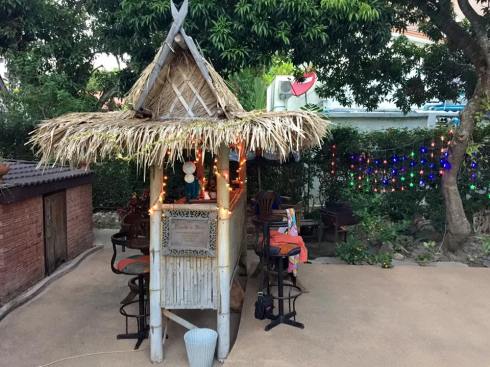
A lot of these you’re not going to be able to call and talk because they don’t have people who speak English sometimes. I usually go to their websites so I have their email and I email them. And then I get their Facebook and I communicate with them through Facebook, I learnt that this works well in Thailand.
And then I ask a friend who’s there, who I know well, to go and pay the deposit for me. Because the wire transfers…. Now actually I’ve been using TransferWise. It’s amazing. If I had known I could just make a transfer through TransferWise! Because in Thailand they’re not very Paypalled…yet!

On coworking spaces…
I always use coworking spaces at least for a short while in each place because it’s amazing to network and, now that I have the podcast, I’m constantly looking for people that have exciting careers around me that I can interview.
For me it’s more networking than anything else. I’m the sort of person that disrupts the coworking a bit. There are a lot of geeks and people who are very introverted and they don’t want to talk. But I always think that if people joined a coworking space, it’s probably because they want to meet people. So I’m usually the one who’s the first to say “Hi where are you from? What do you do?” I noticed that if I don’t ask I can just sit there for a month and people will not even know who I am or where I’m from. So you have to do it first. But once you do, people are open and I’ve met many friends. You’re going there for at least a month so you’re seeing that person over and over and over. You always have that little coffee break or lunch break. It’s much easier to make friends with like-minded remote people.
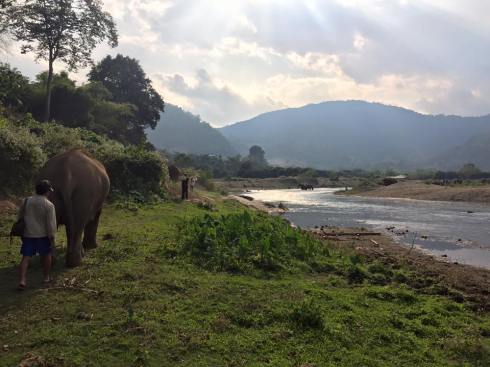
… and her favourite co working spaces
In Chiang Mai, for sure it’s Punspace. There are two Punspaces, I went to the one near Nimman. Here in Valencia I’ve tried two. The first one, I didn’t like. It was very expensive and the manager, for example, never even bothered to ask me my name or where I was from. They have a bunch of events but, I don’t know if it’s the Valencia culture that they take longer to let you in the group, you know what I mean?
The second coworking I joined here is awesome. I had this huge desk for 150 Euros a month. Fixed desk, wasn’t even flex. Because you usually have the option of flex – you just bring your laptop and sit wherever is free – or fixed, you pay a little bit more to have your own desk. So I got 150 Euros for a fixed desk, which is pretty cheap in a very good location here in Valencia. And they let me do my free English class, my free digital coaching groups. Because I create these meetups wherever I go, where I can share my skills for free with the community. Some coworkers want to charge me by the hour but I’m like “but I’m not charging people, it’s free and all the people who work here can join for free.” The first coworking here in Valencia, they wouldn’t let me do it there and they wouldn’t help me advertise it to their coworkers. The second one was pretty cool, they helped me advertise, they let me do it for free.
There’s nowhere like Barcelona for coworking. In Barcelona, I can tell you, Cloud Coworking has the best view I’ve ever seen tin my life of Barcelona. If you go there, make sure you make sure you go up and take some photos from the view.
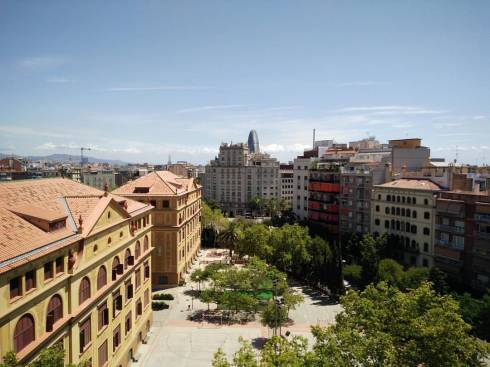
On her vision for setting up her own coworking space
It’s funny you’re asking me because that’s exactly what I’ve been talking about with all my friends. I launched a new program called Live Intensive Coaching where I allow my clients to come hang out with me wherever I am. So Lucie my client that I have in Rio, she’s 54 years old, which to me is really special because not a lot of people that age take that risk. She left her 21 year old son and her 19 year old daughter in Rio for the first time by themselves and she took two months off and came to hang out in Thailand with me.
We went to a meditation retreat, it was her first one, that was a very big challenge and she did it. I took her to meditate with me and took her to work out with me and do my performance routine, and I took her to my coworking and she would work side by side. So she was just observing everything that I do and how I do it.
It changes so much from having one hour online with that person every 15 days and having that person side by side with for like ten days.
So I launched that. And now that I’m here and I decided to stay here (Valencia) at least eight months a year. I have been already researching. I hired a lawyer and I’m talking to her to see the business side of things, tax-wise and all of that.
So my dream now is to have my own coworking. Maybe I can partner up with other coworkings that I really enjoyed working with. It would be a language school early mornings and late evenings and then during the day we would have maybe ten desks – I don’t really want it to be big – where we are also going to have group coaching sessions. So every Monday or every Tuesday morning, whatever we decide, it’s going to be a fixed date, eight or nine in the morning after meditation practice we will sit and we will share our goals for that week. And everyone in that coworking is supposed to be helping each other. So we can actually have a little mastermind. How can you help someone reach their goals this week, something like that.
Being here of course, if someone comes – like, I have a client in the States – if she decides to come and stay here for a month, working at my coworking, great. You’re going to be coached and we’re going to be doing stand up paddling at the weekends. We’re going to be wine tasting in the Spanish wineries. I’m going to try to include a little bit of local cultural stuff in the package for people to join for, you know, a minimum of ten days but they can stay like a month, two months if they have that kind of flexibility.
And then you can see what it feels like. It’s tasting what it would like to be digital for a little while, even if only for a month. Because a lot of people have a maximum thirty days of vacation, so this could help them try it out before they quit their job.
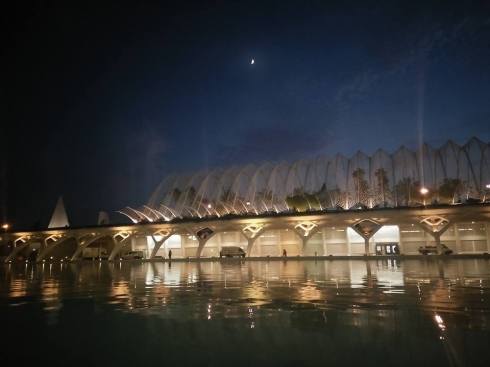
On her favourite moments as a digital nomad
Oh man, so many! The first one that comes to my mind is my silence retreat in Thailand. That was really really special because I can’t believe I took so long, like 38 years of my life, to discover that. The power of being disconnected. Especially for us who are digital. Disconnecting, you know, turning in your laptop, your cell phone, not having internet, going in the middle of the jungle, not being able to talk or say where you’re from and your name… for a person who talks like me (laughs), can be terrifying.
Sleeping on a cement bed for ten days and going to bed at nine, getting up at four, eating vegetarian food, eating your last meal at one PM, it’s a big package! Overcoming that, and learning the power of silence in my life, it has actually changed….
Ok, so I see the digital nomad thing as a process of self-discovery. It’s basically one trying to discover who they really really are. When you’re detached from your family, your home country, you’re detached from your clothes, your shoes, you know, the comfort. And the things that still happen, the things that you still feel, that’s really really you.

I discovered that I feel much better when I’m i a city that is more silent. So that’s the reason why I left Barcelona and came to Valencia. Because Barcelona and Chiang Mai are high-frequency cities. There’s always something going on. There are so many friends, so many events and I always thought that that’s what I wanted for me. But now I discovered that I want it for a little bit but I want to come back to a place that’s more quiet. And that came from my meditation retreat. Because I discovered that the silence made me feel so calm. I hadn’t been that calm ever. I just discovered the best place I had ever been to – and this is great discover for a person who’s looking for a new country – was inside myself. So I don’t need all that traveling for me to find that little delicious place, so that was special for me.
Everyone who’s wanting to be a digital nomad I think that doing the ten day silence retreat is a must because I believe that everybody who is on this path is trying to discover who they are and I think that ten days being in silence and listening to your own thoughts is very deep and can help in many ways.
On the best food she has eaten as a digital nomad
Pad Thai from (TAM jai sung) this little corner in Chiang Mai of this woman from Myanmar, that I love, it’s right next to Small House Kafe.

On defining success
Success for me is waking up excited to do whatever it is that you’re going to do and making sure that what you do is not only bringing benefit but to others and having a balanced healthy life with friends, family and freedom.
On creature comforts
I have a few but I’ll tell you the first one that popped into my mind that everyone always made jokes about. I carried scales in my backpack (laughs). I always have this little scale so I can weigh myself. Yeah, I could never leave that behind.
And I have a plastic popcorn thing so that I can do popcorn in microwaves, I’m addicted to popcorn! So my mum gave me the popcorn thing and it’s plastic so it’s easy to put in your backpack. And the scales are because I love eating and I love drinking wine and because my metabolism is super slow, so if I don’t watch myself and exercise five times a week I gain weight and I don’t want to be fat. So the scale is kind of weird it was always in my backpack and my friends were like “I can’t believe you carry that everywhere you go.”
And I have three very light portraits with pictures of my family and like these little angels and stuff. So, the first thing I do when I arrive in a place is set this up, the portraits and my little angels and my scales and then I feel like OK, oh and I have this little cushion that I put on the bed. And it just transforms this space into my house.

On morning routines
First thing I do in my morning routine. I drink a big glass of water with half a lemon squeezed to clean all my cells. Especially because we digital nomads tend to drink a lot – I love drinking wine! So in the morning, it feels like I’m cleaning my liver and starting fresh.
So I do that and then I sit and I meditate for twenty minutes and then after those twenty minutes, I sit and I open my Evernote and I write. And I have discovered writing as the best therapy I have ever done. So I write about several different things. It’s not that I’m writing a book yet, I really want to, “today I feel like writing about Valencia” or “today I feel like writing about my brother” or this client who overcame a problem. I’m always trying to write about something that if someone else reads it, it could benefit them in some way.
Sometimes it’s just for me. Writing is so relaxing. Transfering what’s in my mind during meditation. There are some thoughts that keep disturbing so I try to write about them to get rid of them.
Then of course, do some cardio, get that blood circulating. I do that four or five times a week. I do a little bit of weight lifting, that’s a bit boring but I know we need it, especially at 41… and single!
My dad used to say my shares are in the market! So you have to make them valuable (laughs).
Huge thanks to Mari for taking the time to share her wonderful stories, wisdom and experiences. Please check out Mari’s website and get in contact with her if you are interested in her career coaching services. You can also find Mari on Facebook and Twitter and you can also check out her Exciting Careers Podcast in which she talks to people with all kinds of different jobs and lifestyles.
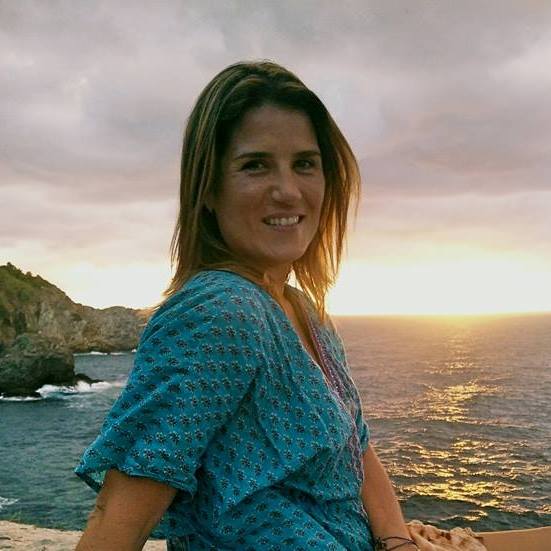
Great images 🙂
LikeLike